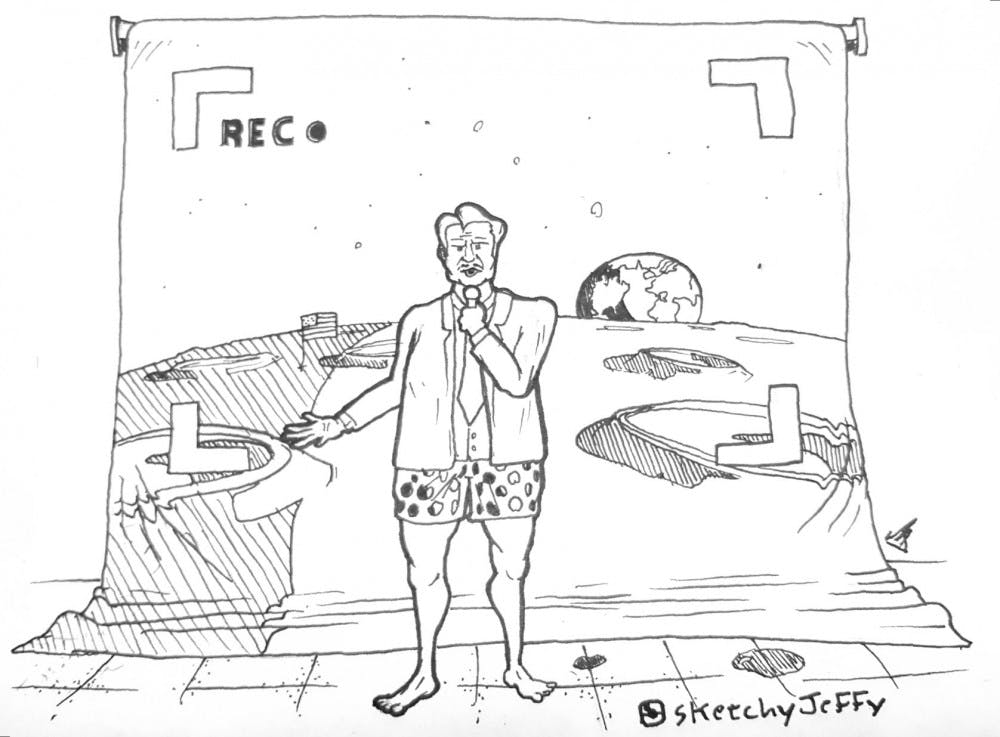The President of the United States recently tweeted that The New York Times was “fake news.” Trump labeled CNN reporter Jim Acosta as “fake news” 17 days before that, and on Tuesday doubled-down on his opinion of CNN during a Black History Month event.
“I don’t like watching fake news,” Trump said at the listening session. Some of his supporters share the same sentiment about the network.
Sarah Sansoucie is a 28-year-old Twitter user from St. Louis who prefers to get her news from many sources, but certainly not CNN.
“Mainstream media is 85 percent lies and is the main reason we have racism,” Sansoucie said in a Twitter message to The Daily Helmsman. “Most of their stories are bought, and they don’t cover the truth.”
Sansoucie prefers to hear from sources like Alex Jones, who The New York Times describes as a conservative provocateur and conspiracy theorist. Publications like The Times categorize Jones’ website Infowars.com as “fake news.” However, Sansoucie said she does her research before she “calls a flag on fake news.”
“I think Alex Jones is a lot like myself,” Sansoucie said in the message. “We are truth seekers. We all have opinions. He has a strong team that researches unlike CNN.”
Thomas Hrach teaches journalism courses at the U of M and worked as an editor and reporter at The Marietta Times in Marietta, Ohio for over 18 years. Hrach finds CNN to be a credible source for news.
“As for CNN, I find it to be a credible news source just as I find Fox news and the other cable and broadcast channels to be credible sources,” Hrach said. “My advice to anyone is to read, listen and watch as much news as possible, and then make your decisions on what is accurate.”
David Mitchell is a 23-year-old from Germantown who watches The Young Turks, reads Breitbart.com and follows various sources on Twitter. Though a registered Democrat who voted for Obama in 2012, Mitchell proudly voted for Donald J. Trump in the 2016 election.
“I’m a big Trump guy,” Mitchell said. “I love Trump. Yes, he can be wrong. He has no filter, but neither do I, and who am I to judge?”
Though it is not his only source of information, Mitchell also regularly watches Alex Jones’ Infowars.
“He knows what’s going on, and there is a greater force of government that is trying to take over the world,” Mitchell said. “I really do believe that, and I don’t believe it’s just American people influenced. It is a global elite trying to take over the whole world for one government operation.”
Like Sansoucie, Mitchell isn’t a fan of mainstream media outlets.
“Mainstream media is fake news,” Mitchell said. “What mainstream media showed the Dakota pipeline? Nobody. I think MSNBC talked about it for like 30 seconds?”
As far as print publications like the The New York Times and The Washington Post go, Mitchell still prefers other sources.
“I don’t really care for them,” Mitchell said. “They could be left-wing, right wing –I don’t know. I really don’t know. I see them. Wa-Po, is that Washington Post? I don’t know about them.”
In 2011, Alexander Zaitchick of Rolling Stone reported that Alex Jones had built a larger online audience than Glenn Beck and Rush Limbaugh combined. Jones didn’t attend a school known for journalism, but graduated from Austin Community College.
Mitchell doesn’t always agree with Jones.
“Sometimes I’m like ‘come on...get your own opinions out of there,” Mitchell said. “But really, I respect the man a lot where it doesn’t make me turn off the dial.”
Still, Jones is no stranger to serious controversy. Jones has suggested that the 2012 Sandy Hook Elementary School shooting did not happen and also supported the “Pizzagate” conspiracy, which implied that a northwest Washington pizza restaurant was connected to an alleged child-abuse ring led by Hillary Clinton.
“Pizzagate” articles were labeled as false by The New York Times, The Washington Post and fact-checking website Snopes, but 28-year-old Edgar Welch, who fired an assault rifle in the restaurant, admitted to The Times that he did occasionally listen to Alex Jones podcasts.
“This guy showed up with guns? We can’t have that kind of craziness in our society if it’s based on fake news,” Otis Sanford, a professional journalist of 42 years, said. “I just have a real problem with that.”
Sanford currently writes a column for The Commercial Appeal, was the publication’s deputy managing editor in 1994 and has worked both at The Pittsburgh Press as an assistant city editor and Detroit Free Press as a deputy city editor.
“I know what’s reputable and what’s not. I’m only going to sites that I know that are reputable,” Sanford said. “Those to me - the more traditional news sites.”
Sanford doesn’t trust one site in particular.
“I do know that Breitbart is not reputable,” Sanford said. “I can say that without hesitation ... Breitbart caters to a group that is anti-a lot of things: anti-diversity, anti-gender diversity or gender-equity, certainly anti-Obama and they are not above stooping to do unfair, phony news.”
Young people should not get their news from Breitbart, according to Sanford.
“You are being misled and naively misled at that. It’s a matter and it’s a case of media-illiteracy when you do that,” Sanford said. “We want to be informed, and we want to be informed properly. We don’t need false, fictitious made-up news.”
Sanford offered advice for coming across unfamiliar internet news sources.
“When I look at them and I’m not familiar with them I take them with a grain of salt,” he said.




